#highlights and centers ‘flaws’ in an interesting way
Explore tagged Tumblr posts
Text
I don’t like when love interests are kinda shitty but the narrative treats then like they’re justified, but there’s a specific dynamic I really like where it’s
main character: actually I find your shit personality super attractive <3
love interest: what… the fuck is wrong with you
#my ramblings#not a lot of romances go full force with that#but yknow#letting down the mask of perfection counts for this imo#the reason i’m thinking abt this is bc there’s a bl webtoon that’s prett new#and it seems to be Actually Committing To This Kind Of Dynamic#where the mc is a writer of bl novels#and is looking for something to inspire his next work#but he only likes writing scummy mls (he thinks nice mls are too static)#so when his friend introduces him to a handsome guy he’s like eh. he’s too nice.#but when he sees the handsome guy threatening someone in an alleyway he’s like omg… charm point#lmao. genuinely very compelled by that#bc yknow it’s less about. accepting or normalizing mistreatment#and more like oh ok lmao mc’s hyping this up full force and on purpose because he likes two-faced people. I love that#highlights and centers ‘flaws’ in an interesting way
78 notes
·
View notes
Note
Yk i saw one of your posts a while ago that was like "theres a clear difference between jay fans and kai/cole ones" or Something like that and im kinds curious what u meant
U asked this so long ago but I forgot to respond better late than never tho🥲
It was about Kai and Jay fans (Cole fans are kind of in the middle of the spectrum)
Lots of Kai fans are super adamant about their fav being unproblematic from what I’ve seen. They don't like when you call him selfish, like they think he could never do anything wrong. But he has good AND bad traits. He is self centered and immature and I love that about him, he's so bland without his anger and his desire to be the best. I'd just like to see more people acknowledge this part of him, rather than focusing only on how caring he is or how protective he is. Nothing about that is interesting to me without his unhealthy traits that balance him out.
Jay fans are the complete opposite (at least the fans that don't prefer later seasons Jay, but that's an entirely different topic that I also have way too many thoughts about). They're pretty loud & proud about Jay's flaws. A lot of Jay fans (including me) are upset that wildbrain era took away his most prominent issues. His arrogance and selfishness are his appeal, and tbh I think a big part of Jay fans' enjoyment of his worst traits comes from the fact that they were taken away from him. We miss the bitchy, morally questionable Jay, back when he was actually a unique and complicated character. We want him to be who he used to be; the witty, sarcastic, and pessimistic guy that we miss so gosh dang much.
Not that it doesn't go both ways buuuut this is just what I've noticed. Actually Kai and Jay as characters are fairly similar in my opinion, regarding their flaws. It's weird how differently the fandom treats them. But I could go on and on and on so I have to force myself to stop it here😭😭 moral of the story, Kai fans highlight his positive traits, while Jay fans highlight his negative.
But also anyone can see them however they'd like and I'm not tryna force anyone to view the characters only how I view them. Idgaf really but it's just an observation
5 page essay dropping soon guys
#if no one else has noticed this it's probably because it's only prominent in my tumblr inner circle#but maybe other ppl have seen this and im not crazy but maybe i am. maybe i am#ninjago#lego ninjago#jay walker#kai smith
125 notes
·
View notes
Note
I'm not really sure if this is has been asked before, but how do I write a believeable egotistical character?
I don't mean in a cutesy, likeable way either I mean egotistical in a way that kind of makes you want to strangle them.
Sorry if this doesn't make sense. :')
How to write a believeable egotistical character
Your question is really interesting!!
Creating a believably egotistical character who evokes strong negative emotions can be a compelling challenge. Here are some tips to help you develop such a character:
Establish consistent behaviors: An egotistical character should consistently exhibit behaviors that emphasize their self-centeredness and inflated sense of self-importance. Show them constantly seeking attention, disregarding others' opinions or feelings, and demonstrating a lack of empathy. Consistency in their actions will make their egotism more believable.
Show excessive self-promotion: Egotistical characters tend to constantly promote themselves and seek validation. They may boast about their achievements, exaggerate their skills or talents, and constantly seek admiration from others. Portray them as always looking for opportunities to showcase their superiority or belittle others.
Highlight a lack of empathy: Egotistical characters often demonstrate a lack of empathy towards others. They may dismiss others' problems or feelings, use people for their own gain, or manipulate situations to benefit themselves. Emphasize their indifference to others' needs or emotions, and their tendency to prioritize their own interests above all else.
Use arrogant dialogue: The way your egotistical character speaks can contribute to their unlikable nature. Give them dialogue that is condescending, dismissive, or patronizing towards others. They may interrupt or talk over people, dominate conversations, and belittle others' opinions or accomplishments. Their language should reflect their inflated sense of self-worth.
Portray a lack of self-awareness: Egotistical characters often lack self-awareness regarding their own flaws and the impact of their behavior on others. Show them oblivious to the negative consequences of their actions, and resistant to feedback or criticism. They may be unable to recognize their own shortcomings and instead blame others for any failures or setbacks.
Create conflicts and antagonistic relationships: Egotistical characters tend to clash with others due to their self-centered nature. Develop conflicts and antagonistic relationships with other characters who challenge their superiority or refuse to tolerate their behavior. These conflicts can highlight the negative effects of their egotism and further emphasize their unlikable qualities.
Show vulnerabilities and insecurities: While egotistical characters may project an air of confidence, they often have deep-seated insecurities driving their behavior. Explore their vulnerabilities and the underlying reasons for their need to constantly assert their superiority. This can add complexity to their character and make them more human, even if it doesn't excuse their egotism.
Provide opportunities for growth or consequences: Consider incorporating story arcs that allow your egotistical character to experience personal growth or face consequences for their behavior. This can create a more dynamic character arc and add depth to their journey. Whether they learn from their flaws or suffer the repercussions of their egotism, it can make their character more compelling.
And here are some common features of egotistical character. I hope they can help you:
Constant self-promotion
Dismissive attitude
Interrupting or talking over others
Exaggerating accomplishments
Need for control
Lack of empathy
Sense of entitlement
Inability to accept criticism
Patronizing or belittling language
Overestimating abilities
Remember, it's crucial to strike a balance between creating an unlikable character and ensuring they remain believable and engaging within the context of your story. By incorporating these tips, you can develop an egotistical character who evokes strong negative emotions and adds tension to your narrative.
If you want to read more posts about writing, please click here and give me a follow!

#writeblr#writerscommunity#writersociety#writers#writer things#writers on tumblr#on writing#writing#creative writing#writblr#writings#writer#write#writers and poets#artists on tumblr#women writers#ao3 writer#author#writing community#writing stuff#writers block#writer tips#writer community#writer on tumblr#writer problems#writer stuff#writing resources#writing reference#writing research#writing related
152 notes
·
View notes
Text
I do genuinely like that Pelor is difficult, alienating, intensely flawed, narrow-sighted, and very hard to like. It does force those characters interested in the question of whether the gods are worth saving to actually GRAPPLE with the question on other merits (like what his relationship to his followers is like, the things he allows them do to for better and for worse, what his priorities are, etc., all valid negative points against him) instead of making the decision on a basis of raw likeability as if judging personality contest.
And, if one does still consider it maybe worth saving the pantheon, then additionally having to reconcile with the fact of being likeable or dislikeable or anywhere in between doesn't have an effect on whether they have the right to continue existing.
The idea I'm referring here is that the question of whether the gods should continue to exist is often decided on a basis of personality alone, whether it be Pelor and the Raven Queen are hard to like or Melora and Sarenrae are really likeable. That's existed since before Uthodurn, before Hearthdell, and it's felt hollow even then.
It's interesting to see Deanna especially directly confront these shortcomings and difficult and unlikeable things about Pelor, even directly highlight them in moments between herself and him, and then seemingly not give that dislikeability alone (just the way he can be unlikeable and has a difficult personality) significant weight in against the philosophical questions here, rather preferring to weigh those aforementioned other merits. The conflict of personality between them has great weight for the future of their own relationship (not great), but less toward an answer on the future of him and the pantheon as a whole against Predathos (still working on saving them from Predathos, even when covering her holy symbols). It's happened while in Wildemount, and it's again here in Jrusar.
Whatever one's feelings are on the question, I do really like that one of the major gods at play here doesn't make the question easy to answer using charisma and likeability—because that isn't the point. Trying to answer the question within this narrative on raw basis of whether a god has a right to exist or should be destroyed while centering whether they're likeable or not likeable is incredibly reductive, just as it is pointless and hollow to make the same assessment of individual mortal people. Their personalities alone aren't worth consideration at all; there's more important things to weigh for anyone grappling with that question.
#ETA: I should've worded it as 'the gods right to not get eaten by a cosmic horror' but too many people reblogged it already for more editing#Critical Role#CR spoilers#Critical Role things#Deanna Leimert#I don't have a Pelor tag
385 notes
·
View notes
Text
In defense of Andrew Graves: A character arc in one sentence
HEY! I rewrote this essay and fleshed it out a lot. I'm keeping the original here for posterity, but the new version renders this one completely obsolete. Find it here!
I've focused a lot on Ashley in my past writings. She's my favorite character in the story (and depending on how episode 3 pans out, maybe ever) and I'm pretty mortified by how some parts of the fandom have reacted towards her, so I pretty much made it my life's mission to push back against that. From highlighting the ways Andrew mistreats her, to coming up with justifications for her behavior that aren't just being a manipulative bitch, I really wanted to prove that a more favorable picture of her could be painted than most were willing to.
But in doing so, I've left Andrew in the dust.
In highlighting his flaws and the ways he mistreats Ashley, I think I've implied a level of intentionality to his actions that I don't believe he has. Most of his worst actions are spur of the moment, or caused by a fundamental conflict that exists between his desires and his idea of the way things should be. That doesn't excuse them, obviously! But they do reveal interesting things about his character and how it develops over the course of the game. He starts out as a doormat, but eventually settles on either his bitterness or a sense of calmness and acceptance, both over Ashley.
But what exactly causes this change?
There's plenty of reason to believe that he was slowly evolving before the story took place, but within the context of the work itself, I believe there are two points where he can no longer ignore the changes that have happened to this point, both of which are in the first chapter: The killing of the warden and the 302 lady. In the first case, he was forced to do it to protect Ashley in a way he hadn't done before, or depending on how you look at it, since the death of Nina. But the intentionality was the key point here. After this point, he calls Ashley Leyley, which may or may not seem important at this point, but it's something I'll draw attention to later, so keep that in mind.
Next is the killing of the 302 lady, which is the much, much bigger point. We don't learn much about it until later on- as at first he just gives an excuse about the nail gun that doesn't line up with what we see on the map- but during the dream, it's revealed it was a calculated, intentional killing that he did to make sure there was no evidence left behind, and because Ashley (supposedly) would've wanted him to do it anyway. I say supposedly because Ashley herself doesn't seem to ever want Andrew to kill for her past Nina's death, because he only ever kills for her to defend one or both of them. If you want more evidence that violence for violence's sake isn't something she wants, look at this part in the final dream:

A knife isn't what opens the door, despite it being placed on the ground in that very map. While it seems obvious that the knife (violence) would be the key to solving the puzzle, it's put there explicitly to show you that it isn't. It's not what she wants; what she wants is a flower.
So, why is this important? Why am I centering Ashley- again- when this essay is supposed to be about Andrew?
Because I think it's important to point out the discrepancy between what he thinks Ashley wants, and what she really wants. When Ashley starts to grill Andrew over the killing of the 302 lady, he gets mad. Very mad. Ashley sees it as pointless, as him covering his own ass, but he genuinely did it for her sake, because he thought that's what she wanted, and that it'd make her happy. But what makes her happy isn't violence- or any similarly extreme action for that matter- it's attention and validation. Something he's always reluctant to give her, despite the fact that he always chose her over the alternatives. But despite making that choice, it's always empty and meaningless, because in Ashley's mind, he never did it for her sake.
And hoo boy, does he not like it being framed like this.
But is she wrong, though? He WAS the one who chopped up the Warden, and he WAS the one who chose to kill the 302 lady. Violence is his job, it's all he knows. He has to do it to take care of Leyley, right? To protect her? To keep her happy? Then why doesn't he ever acknowledge it? Why does he never admit that he did it for her sake, to keep her happy?
Because he doesn't know what he sees her as.
In his unique dream sequence, he sees two versions of Ashley; the child version of her- Leyley- and the adult version of her- Ashley. And the differences in the ways he interacts with the two of them are stunning. Leyley is an obstinate, annoying child. She's the one he NEEDS to take care of, and he hates that. He hates Leyley for what she did for his childhood. He hates that he needs to provide for her. He has the option of trying to kill her, even, over something as small as a candle!
But in the room with all the murders, the gilded cage, he sees Ashley as an adult. This version of Ashley is stuck in a closet that he himself has to open- and to choose to see. Their interactions are calm and friendly. She teases him a bit, sure, but she's still helpful, and they have fun together. He doesn't need her, and she doesn't need him. He needed Leyley- needed the candle- but here, there are other limbs strewn about for him to take. And, crucially, he doesn't even have the option to kill this Ashley for one of the limbs.
And during the choking scene, he lets her go the moment she acknowledges that he doesn't need her anymore.
What he really wants is Ashley for Ashley's sake. Not for what she can provide him. He doesn't even need her for sleep, he just wants her. But Ashley has trouble acknowledging this, because he's never before shown that WANT. Only a NEED. She keeps trying to find ways to make him need her, because she's never seen what his desire for her is really like. She's only ever seen him desiring someone else, someone other than her. She's only ever seen him as Andy, because she's never truly seen Andrew, only the violence he can inflict on others. Andrew, meanwhile is arguably further along in the realization of their relationship, because he can see and acknowledge both sides of Ashley.
He can see Leyley, the needy, bratty child who always needs his attention, that he needs to provide for. The one he hates and wants to get rid of. The one he kills for to protect. And he can see Ashley, the one who engages in friendly and cute banter with him. Who comforts and shows him physical affection. The one he loves. The one he kills for to make happy.
He just can't choose which one he wants to see. Every outside influence- from his parents, to Julia, to Nina- makes him see her as Leyley. Ashley herself makes him see her as Leyley too, whenever she brings up all the things he did for her, and calls him Andy, his child self, instead of Andrew, his current self. And as long as he sees that child, he feels like one too, and can never give Ashley anything that comes from the heart.
But he really, really wants to see Ashley as an adult. He wants to take pride in her, how much she's grown, and how driven and competent she really is.
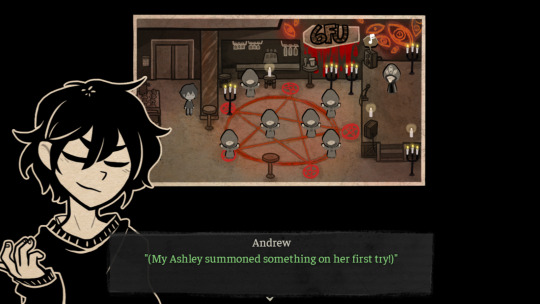

But god damn, does that bitch ever make it hard.
But in the end, it's him who has to make the choice how to see her. Ashley can only see what she's shown, but Andrew can choose.
And in the basement scene, he makes that choice.
If Ashley refuses to leave him alone with their parents, that's it. In one of the most critical and important moments of his life, she couldn't give him the space needed to make up his own mind. She couldn't treat him as an adult. She couldn't see him as Andrew. If she does give him that choice, she chooses to acknowledge that Andrew is an adult who can be trusted to make his own decisions, even though she (perhaps foolishly) believes that this choice lines up with her own interests. And frankly it does either way, but in accepting their mom's offer, her chooses to see her as Leyley once and for all. He chooses not to reciprocate what Ashley showed him. He does it because he needs to, not because he wants to. Because it's his duty, not his desire.
But if he WANTS to?
That respect becomes mutual.
In choosing to treat each other like adults, to treat their relationship as one of desire rather than need, Andy starts to die. From that point on, their relationship becomes a lot more friendly, lighthearted, and playful. They ironically start acting more like children, but to quote CS Lewis:
"Critics who treat adult as a term of approval, instead of as a merely descriptive term, cannot be adult themselves. To be concerned about being grown up, to admire the grown up because it is grown up, to blush at the suspicion of being childish; these things are the marks of childhood and adolescence."
He's not ashamed of being playful with Ashley, or showing affection towards her. He's grown up. He finally sees her, and himself, as an adult- although he still doesn't show that in full until much later on (more or that later). But in Decay, he still sees her as a child, and to an extent, probably himself. Let's compare the ways in which he reacts to being called Andy. In Decay, he lashes out at Ashley and gets angry, even threatening her. But in Questionable Burial, he calmly says that Andy is dead and doesn't need Ashley's comfort, but still tries to reassure her that she's still needed. He's not ashamed of or hostile towards their prior dynamic, because he's grown past it. He still recognizes Ashley's need to feel needed, but he still RECOGNIZES it, where he was hostile towards it before.
It's a display of respect towards her feelings.
This interaction doesn't happen in the Sane ending, however. He doesn't play games with her and is just a lot less fun to be around all together. Why is that? Because he still hasn't yet shaken viewing Ashley as Leyley there. He still views her as a burden, as someone who needs taking care of. He's calmly accepted that, too, mind you, but he lacks respect for her because she's still a child, in his mind. But in Questionable?
The vision did more than just make him extremely embarrassed and lay his deepest desires bare. It forced him to recognize Ashley as an adult. When choosing between "Never" and "Never say never," if Never is chosen, the burden of thought is lifted off of him. But if Ashley chooses "Never say never!", he has to reckon with the fact that Ashley is an adult, someone who can consent to those kinds of things. Someone who MIGHT. Someone who has agency, and can make her own decisions. And more importantly… someone who can trust him to make his own.
Whether he desires sex or not is secondary; he's always had those feelings and has always been ashamed of it. But now that the part of him where that shame came from is dead and buried, there's no childish impulse to grow up. There's no attachment to the hate and bitterness he had before. Look at what he worries about when he picks up that she's uncertain or confused about who he is now:
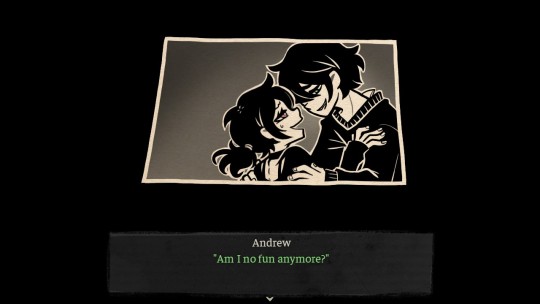
This is the one sentence I was referring to in the title.
It's her feelings.
He wants to be fun to be around. He wants to make Ashley happy. He loves her, and not as a romantic interest or even as a sibling. He loves her independent of all that baggage.
He loves her as a person.
In learning to respect Ashley, our boy has finally grown up. But there's a certain intimacy to being hurt by someone else that Ashley isn't getting in this ending, and now she has to reckon with that. And that's really, really hard to do when you're so used to being hurt.
Especially when you're no longer around someone who wants to kill the part of you that needs nurturing the most.
145 notes
·
View notes
Text
chapter 141 thoughts!
The usual reminder: because of the content of this arc, I will unavoidably have to discuss CSA and topics related to it in this & future chapter reviews. I do not discuss them in great detail, but if you very understandably just aren't in the headspace for that, no hard feelings - look after yourself and I'll see you next time.
This chapter starts us off on the note of answering something I've been wondering for a while and confirming that Ai did, in fact, know that Hikaru was being abused by Airi. On the one hand, this feels like it should go without saying, since it answers the question of where Aqua would have gotten some of this info, but it feels strange to have this dropped on us in such a matter of fact way.
In general, I continue to be both baffled and impressed by Oshi no Ko's dedication to never showing characters learning or reacting to huge, status-quo altering pieces of information on screen lol. I think this is more a case of the movie's framing than the manga's - hard cutting from the HKAI exchange at the end of last chapter to the Ai & Airi confrontation is very cinematically appropriate - but it does bother me regardless. In isolation, I think it's fine and we get more than enough information about Ai's thoughts and feelings on the situation in the confrontation but it's nevertheless part of a pattern that's been going on for a long while now of important reveals and reactions to really huge pieces of information are happening entirely offscreen and are only told to the viewer in retrospect, or are backfilled into the story once Akasaka wants to make use of it. It's not a world-ending flaw or anything but I'm noticing it more and more and I think it's been harming the series more than it's helping.
That said, I do really like this confrontation Ai has with Airi. It definitely feels more like Ai speaking for Aqua than it does Ai herself speaking - the cold, straightforward way she addresses Airi pretty clearly mirrors the way Aqua spoke to the director on Akane's behalf back in LoveNow. Whether this is a case of Aqua using Ai as a mouthpiece or their similarities as mother and son coming out in a moment like this, I think it's interesting either way. Given what we learned about Ai's own abuse and her own history with narrowly avoided CSA, it makes total sense that upon learning someone she cares about was being similarly exploited by an adult that she would have some very strong feelings about it.
Airi's meltdown in response is also something I have mixed feelings on. As a piece of characterization in isolation, it's fascinating and I think it provides some important insight into how and why Airi was able to rationalize and justify her abuse of Hikaru to herself, even though she clearly knows it was objectively wrong. I honestly can't help but see parallels in the way she centers her own feelings and pain and uses that as justification for her actions with Ayumi, Ai's mother, who had a more subdued but emotionally similar breakdown when talking about her history with her daughter.
Ultimately, I do feel it adds more than it takes away - I would much rather see the story continue to humanize characters who could otherwise have just been left as uncomplicatedly black and white Evil People Doing Bad Things. People very rarely begin acting in cruel, exploitative or antisocial ways out of nowhere and I think the manga's story is better for highlighting that this is the case.
H O W E V E R. . . where my feelings become more negative is the talk that follows, but I have like a million things to say about that so I'll put a pin in it for now to not derail too badly.
Given how Airi responds here, I'm also suddenly very curious as to if this direct confrontation was what put an end to her abuse of Hikaru. It's hard for me to imagine her going back to it after being so directly called out and if that's the case, I can't help but wonder if this was the trigger for the HKAI romance. I already talked last chapter that there's some imagery already implying Hikaru views Ai as his light, which OnK thematically associates with the role of a savior in someone's life. If Ai really did manage to intervene and protect Hikaru from Airi's abuse, then that would have intensified those feelings one hundredfold.
holy shit akane AND miyako are back! wow, isn't it totally crazy that across the arcs where they could have contributed to and potentially resolved the conflicts at play they were just totally absent but now they're just reappearing without comment or reaction to any of that other shit!
As I mentioned before, I have really mixed feelings on this scene with Miyako and the others. In isolation, I do like it and I think it kind of brings into explicit text something that had been just floating around as vibes before, which is how absolutely symbiotic with misogyny and sexual exploitation the entertainment industry is. The way misogyny played into Ai's exploration was always a really fascinating part of her arc to me, but given that Akasaka at least publicly presents as a person without that sort of lived experience, I was curious as to how much was intentional and how much was accidental, just because of how surprising it was to see a man centering this sort of thing so thoroughly in his writing. This scene with Miyako makes it clear that it's something Akasaka absolutely wants to highlight and discuss in Oshi no Ko, to the point of him being willing to call out even likable and sympathetic characters like Taiki for casually taking part in and perpetuating it.
THAT SAID… I really don't like that this scene, accidentally or otherwise, ends up centering and discussing Airi's victimhood over Hikaru's. His story has always been an indictment of the way children, specifically, are at risk in the entertainment industry not just in terms of being exploited as workers, but in the ways that adults in power can and will use their positions of authority to do exactly what Airi has done. That is what needed to be discussed here; the way that Hikaru's abuse is in no way an isolated incident and how people like Airi will continue to get away with hurting children so long as the industry - and society at large - treats children like second-class citizens at best and commodities at worst. I do think this scene is trying to use Airi and Miyako's experiences as a jumping off point to talk about exploitation in general and the way a person's ability to say 'no' can be compromised by outside pressures but it talks so much and so exclusively about the experiences of young girls and adult women specifically that it's hard not to read it as the story placing more value - at least for now - in exploring Airi's perspective over Hikaru's and that just feels kind of grody to me.
The timeline of this chapter is also just… really weird? Given Frill's, uh, appearance at the end of the chapter I have to assume it's taking place right after she films her scene with Aqua last chapter but that makes no sense given where the Ai and Airi confrontation is placed…? My best guess is that the scene we get at the start is some kind of visualization of the script by the characters who are reading it but it's all still very needlessly confusing lol
frill just barging in with her tits out when she knew rbkn were waiting for her was so fucking funny though i gotta admit. weird ass lizard woman.
Her mentioning it was her own decision to do the scene like that is also shrimptresting because it seems to implicitly confirm that there is, thank god, SOME kind of intimacy coordinator on set that the cast are talking about these scenes with. I actually also think the level of trust and comfort between Aqua and Frill this implies is also really interesting…? In general, I've always really like the idea of AQFR friendship, so this is kind of making me daydream a bit about seeing more of one…
As for the ending… man, it's such transparent reaction bait that I can't really summon the energy to get annoyed LOL. At least we won't have to wait a whole extra week to see what it amounts to.
Weary as I am with the reaction bait cliffhangers, I am at least glad to see the story coming around to finally addressing the elephant in the room here. As the chapter end text points out in the Japanese versions of this chapter, a scene like this was an inevitability of playing Ai and Hikaru and it's been where I've expected to see the underlying tension that's been floating around AQRB's relationship since the past life reveal finally get drawn out and addressed. Given its placement in the story (ch 142 is only the second chapter of its corresponding volume) and the framing of that last page as more of a gag/punchline than a serious dramatic beat, I don't things are quite going to play out like Ruby seems to want, but I'm nevertheless curious as to wtf is even going to happen
Honestly, at this point, I kind of just want Akasaka to shit or get off the pot. If he's going to bring a topic like incest to the table, then I want him to actually have something to say about it that isn't just Ruby going 'kyaa oniichan' and acting like a fanservice imouto character from a harem anime. If we're going to have something like 'Ruby falls in love with her brother' actually happen in story, then I want to see how she feels about this, how she rationalizes it, how she expects this to play out when she and Aqua live in a society that by and large condemns incest and treats it as taboo. At the very least, give me something to dig into and examine and chew on that wouldn't have already felt dated during the mid 2010s little sister boom.
63 notes
·
View notes
Note
Same anon who just asked about why you placed Adrien as a 7 instead of a 2, only to look deeper in the reblogs of your ML enneagram post and see you already answered it haha!
In friendly defense of 2!Adrien, I’d argue that his reactions to being stressed coming off as more of a 7 rather than a 2 is actually a perfect reflection of the effects of his abuse; it’s fear that drives his non-confrontation tendencies rather his own nature. I think Risk highlighted that a bit in revealing how Adrien does desire confrontation, even if he doesn’t act on it.
(I have always found it interesting to consider the role that trauma/neurodivergency plays in shaping a character’s personality, since it’s one of the flaws I feel most personality assessments can’t really account for.)
I also think Chat’s arguments with LB were more like to be confrontational than avoidant (thinking of the times he’s called her out and his romantic pursuit being the primary indicators), up until she became the Guardian. So then with S4, I’d consider it to be a gradual relationship shift that leads to Chat no longer feeling safe and secure enough in his position to confront her the way he once did, which is why he only tries a bit in Kuro Neko before running, and then doesn’t try at all in Strikeback.
I hope this doesn’t come off as too preachy or anything, just wanted to share my 2¢! Cause either way you slice it, your Adrien has always been brilliantly written and incredibly in-character to me, so you’ve clearly got a rock solid understanding of his character. ❤️
hello november anon and sorry for the delay! thank you so much for the ask and also for going back and looking through my prev posts. you know my teacher heart loves it when you do the readings! 😌 also you're definitely not the only one who believes adrien is a 2 rather than a 7! and while i know there are good arguments for both sides, i'll explain in depth my position on adrien's personality.
part 1 of the ask:
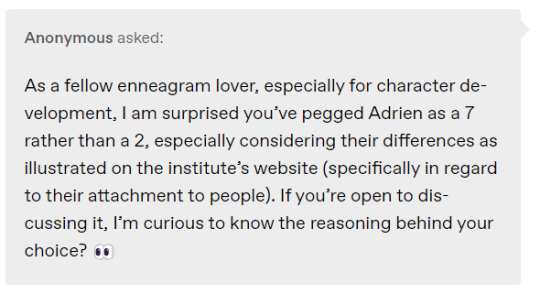
so here are the reasons i think adrien IS an enneagram type 7
adrien's motivation seems like that of a 7 to me: he wants to experience everything and be satisfied in every way he can. if he had a disney princess "i want" song, it would be "i want to go to school, i want to make friends, i want adventure in the great wide somewhere., i want to have fun."
the literal first shot of him in the show (if we use origins as a starting point) is adrien running away. nathalie asks him to please reconsider, he knows what his father wants, and adrien says, "but this is what i want to do." according to the enneagram institute, "sevens do not see themselves as the center of a community or family, but as members of a free-floating band of fellow adventurers whose own enjoyment is enhanced by being with others." going to school and having a new experience with new people is what's going to enhance adrien's enjoyment of life - not being the center of his family unit or the apple of his father's eye.


a 2's motivation would be to be as loved as possible and to make themselves neeed by those they most care about. while adrien definitely shows a desire to be loved and needed, especially by ladybug, i think his primary desire is for experience, and it's this from which all his actions- not just characteristics - are based. take for example his reaction to getting his miraculous vs marinette's (also in origins):
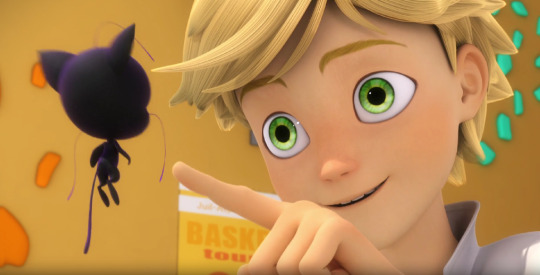
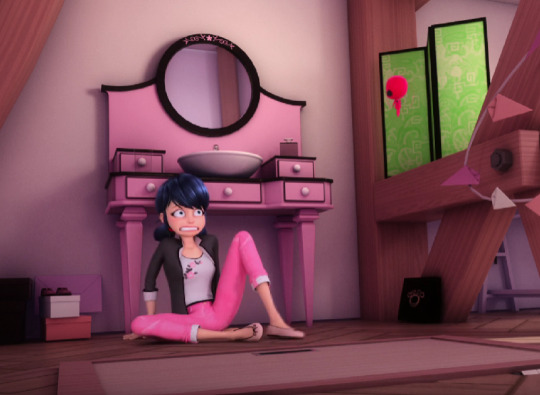
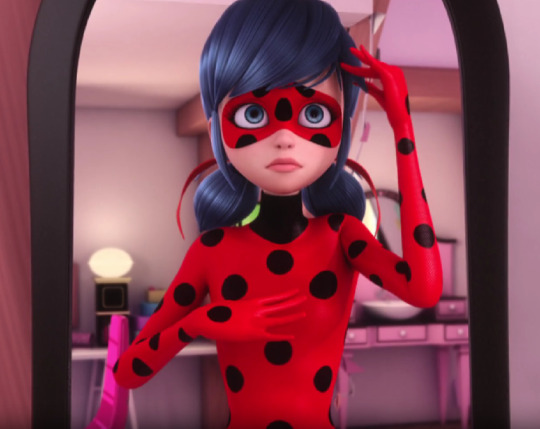

adrien is excited and intrigued and ready to go, as a 7 would be when offered a new experience - and a new way to satisfy their desire to try everything. marinette, as a 1, is quite the opposite: she is being put in a situation where she must do something right or fail, and therefore is stressed tf out. while marinette's motivation to be good/perfect fuels her anxious reaction, adrien's motivation to experience everything and be satisfied fuels his thrilled and slightly reckless reaction. that's why he charges out into battle without listening to all the instructions; his motivation was to escape the restraints of his life and try something new.
in growth, enneagram 7's take on the positive traits of 5's. in stress, they take on the negative traits of 1's. i have seen adrien exhibit these behaviors throughout the show on many occasions!
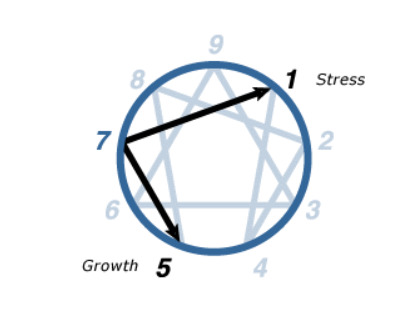
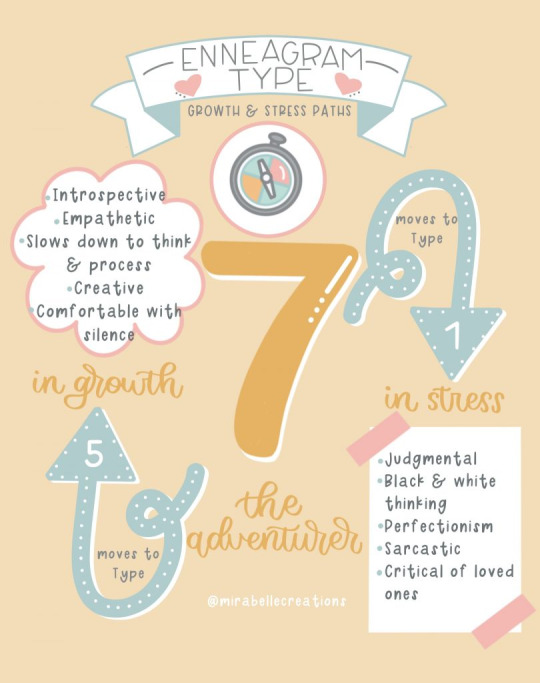
according to the enneagram institute, "Sevens have fear about their inner world. There are feelings of pain, loss, deprivation, and general anxiety that Sevens would like to stay clear of as much as possible. To cope with these feelings, Sevens keep their minds occupied with exciting possibilities and options— as long as they have something stimulating to anticipate, Sevens feel that they can distract themselves from their fears." therefore, while one can argue that adrien's wealth of knowledge and fun facts is a result of everything gabriel has forced him to learn (mandarin, piano, fencing, medieval horse colors), we can assume he at least was interested in it - and that seeking new knowledge like a 5 kept him from lingering in his sadness.
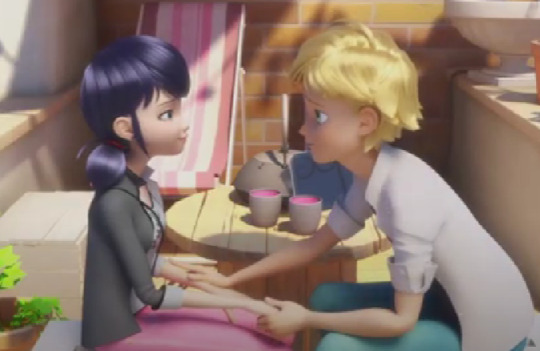


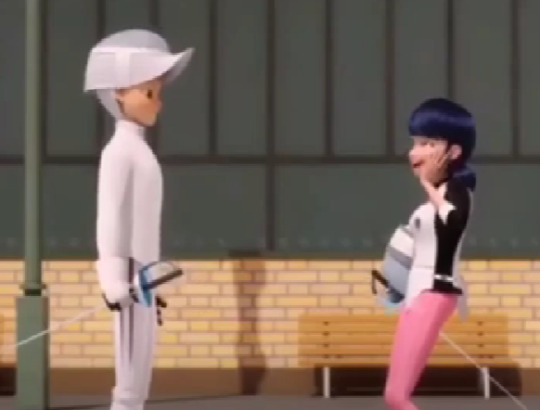
"i'll help you learn mandarin marinette" "i'll show you how to fence marinette" "most people think henry iv's white horse was white my lady" "do you need subtitles my lady i speak several languages"
now as to how adrien moves to the low parts of type 1 during the show: i think the main examples of this are the instances he adopts rigid, critical, and judgemental characteristics, which is potentially unpleasant for anyone who has to be around him.
first up, adrien's akumatized forms: chat blanc, ephemeral, celesticat
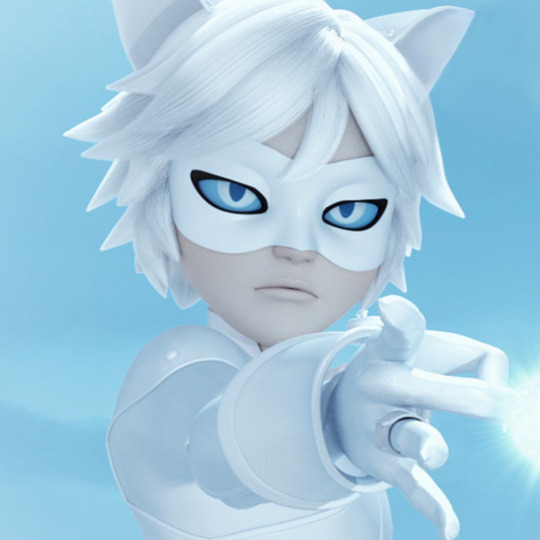
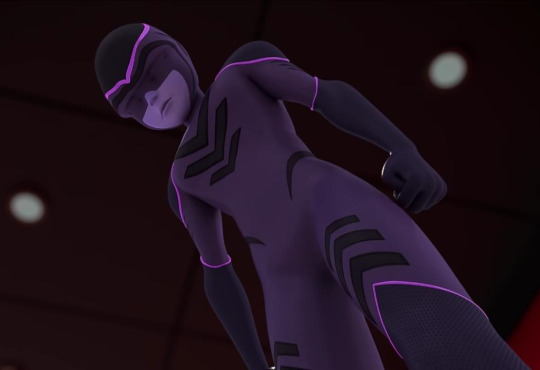
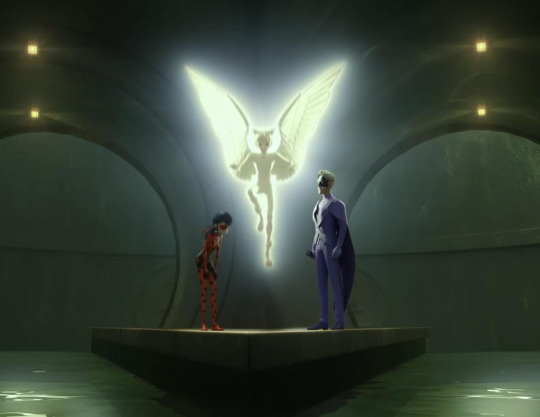
i bring up the akumas because, though adrien isn't in his right mind (by hawkmoth's akumas), they are examples of adrien being in extreme stress.
as chat blanc, adrien wants to either right the world or destroy it for being wrong - the critical supreme judgement an unhealthy 1 is capable of. he lashes out when contradicted, and is quite ruthless even to marinette, who he loves, in the name of executing judgement.
as ephemeral, adrien seeks to control time. (however, this is probably the weakest example because adrien was being amok-controlled in this instance and was acting on shadow moth's will, not his own.)
i include celesticat because while this is an example of a "good" akumatization, adrien was still under so much stress that an akumatization was able to take place. yet even while being in "good" stress, adrien still shows characteristics of 1: perfectionism, righteousness, taking control of the situation. he literally turns into a pure white angelic being, an embodiment of perfection. it's what he believes he has to do in order to salvage the situation. it's one of the more healthier moves from 7 to 1 i have seen depicted in media and is entirely plausible concept under the enneagram's theory! this just goes to show the depth and richness of his character.
next, we will discuss adrien's various alter egos:
cat walker

i've said it before and i'll say it again; cat walker is another move from 7 -> 1.
as chat noir, adrien is at the height of his 7-ness. he enjoys the freedom that his miraculous powers and secret identity gives him, and uses it as a means of escape from the regular constraints of his life and obligations. then in kuro neko when ladybug slights him, she denies him the fulfilment and satisfaction in reaching his full potential as chat noir (e.g., being of equal importance on the team as her) that he should be allowed. of course he becomes hurt and angry! she's stepping on his core desire in life.

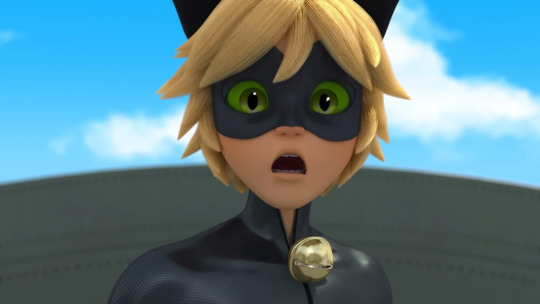

according to enneagram coach dr. tom lahue (my favorite enneagram guy ((also a 7)), "type 7's typically deal with anger by trying to avoid it or deflect it. that really is the anger type of a 7 - deflective. deflecting things away." that's what i believe cat walker is: a stress reaction, a deflection of his anger with ladybug. he deflects his painful emotions into something he thinks is positive; a new start.
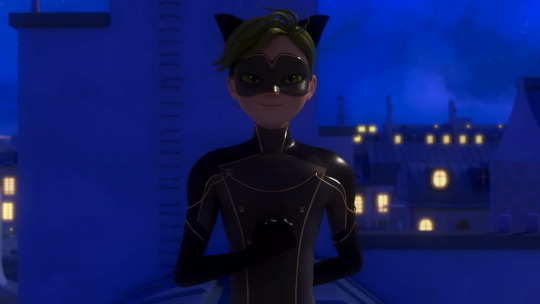
adrien is usually so joyful and optimistic, but this was a huge blow for him. dr. tom says the best way for a 7 to handle this anger is to be "real and genuine" when coming to terms with it, what does adrien do instead? he turns to a new alter ego. he chases the experience of fulfillment, only he does so by adopting a persona who is serious and perfectionist. obviously this was neither what adrien or ladybug needed, and that is because cat walker is a stress reaction who adrien cannot sustain without continued levels of unhealthy self-denial. this is the hardest he has gone to 1 in the show and what it took to snap him out of it was a level of reflection, analysis, and objectivity (that this was an unhealthy behavior) indicative of a type 5 - and which shows his progression to growth.

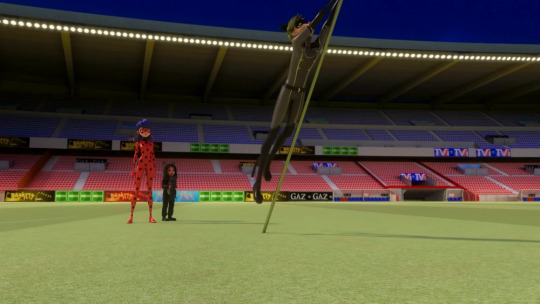
2. aspik
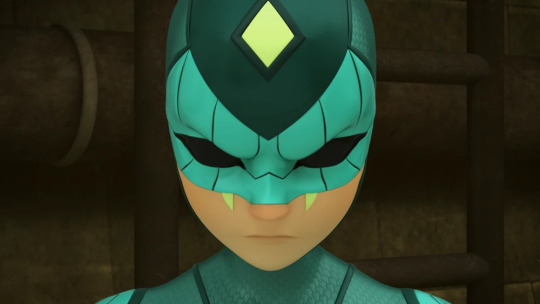
one can argue that aspik is more proof of adrien being a 2 than a 7 actually, as his motivations for becoming aspik were to woo ladybug. however, the stress response of a type 2 is to move to the negative qualities of type 8, which is to lash out at those who they believe have taken them for granted.
according to the enneagram institute,
"Average to unhealthy Twos seek validation of their worth by obeying their superego’s demands to sacrifice themselves for others. They believe they must always put others first and be loving and unselfish if they want to get love. The problem is that “putting others first” makes Twos secretly angry and resentful, feelings they work hard to repress or deny. Nevertheless, they eventually erupt in various ways, disrupting Twos’ relationships and revealing the inauthenticity of many of the average to unhealthy Two’s claims about themselves and the depth of their “love.”
as aspik, adrien was never resentful of ladybug for taking him for granted or making him feel rejected. as aspik, his goal was never to make himself needed by her. as aspik, he maintained some extreme levels of optimism that ignored the rational conclusion that he should give up for several thousand time loops. as aspik, he was able to let go and displace his hopes in himself to someone else - and run off to his responsibility as chat noir with high spirits (though i'm sure the ladrien kiss helped)
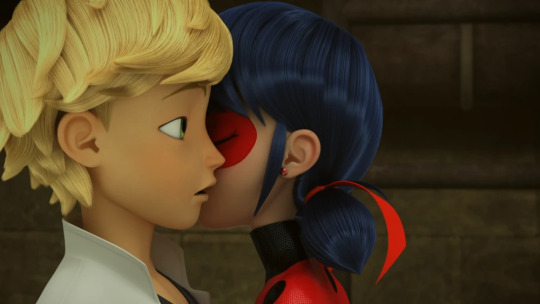
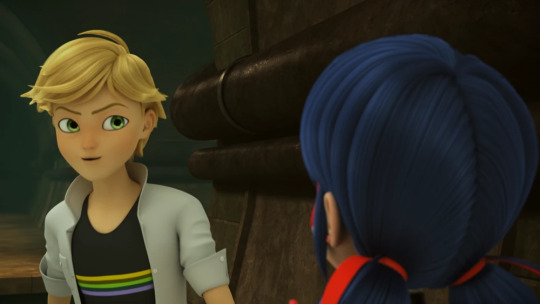
3. griffe noire
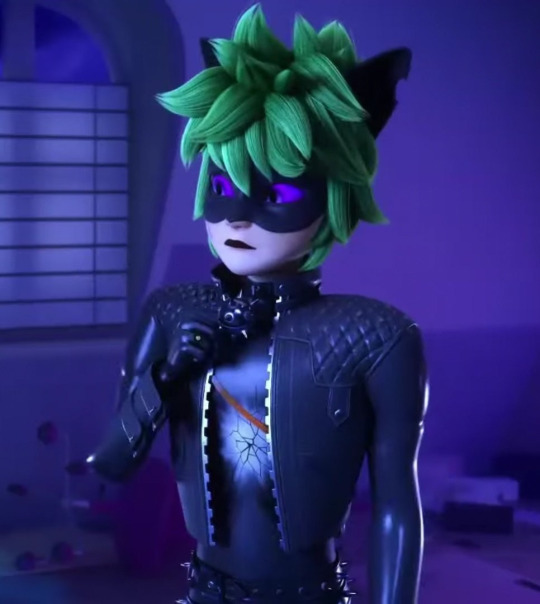
this has got to be the most stressful stress reaction i've seen on adrien. and you might say "but wackus he looks nothing like a type 1" and i say "JUST HOLD ON
going back to dr. tom's analysis on type 7's in anger, he says, "7's typically express their anger indirectly, e.g., through sarcasm, like 5's - like 6's sometimes... but they quickly try to move on and reframe into a more positive way." griffe noire, rather than telling jokes and puns to lighten the mood, mocks and ridicules poor toxinelle who has not convinced me she doesn't have a crush on him. 1's actually do the same thing when they are unhealthy; they criticize and blame and nag others for not being up to par, and by directing his anger at his situation onto toxinelle, griffe noire is doing the same.

dr tom goes on to say, "in some cases [7's] might take impulsive actions to try to free themselves from this feeling of being trapped... engaging in frenetic escapism in behaviors or addictions or substances to try to distance themselves from those who are frustrated with them... or their own anger/pain in life." we have seen griffe noire engage in multiple frenetic behaviors while running amok (haha), all of which are clearly attempts to redirect his pain and anger/ keep it from consuming him. for example, griffe noire takes chat noir's cataclysm to the chest as though it's a game. for another, he openly threatens to destroy the entire world with his super cataclysm. and of course, he is constantly abusing his miraculous by over-exerting his powers in a way only adults should. yet all of these destructive behaviors are still adrien's way of escaping his normal life, and his everyday pain. it's almost like his self-destruction is his addiction.

and yet by the end, it took the introspection of type 5 for griffe noire to realize that his behavior was unhealthy. he observed, he listened, he showed an inquisitiveness that brought him back from the brink. and he also upgraded his outfit so if that isn't a type 7 path to growth i don't know what is!

now i know i won't have convinced everybody, so i just want to drop this section from the enneagram institute's text on misidentifying 2's and 7's:
Although both types are gregarious and enjoy being with people, their interpersonal styles are noticeably different. The Two... would like to be the heart and soul of a family or community, the best friend or confidant everyone comes to for attention, advice, and approval. Twos want to be significant to others and on intimate terms with them, although sometimes they go too far, meddling too much and being too solicitous to make sure they are needed.
adrien is not focused on being needed by anybody, not even ladybug (although due to his romantic interest in her, i can understand why people think so). being the heart and soul of the team is not what motivates him; primarily, i think he just likes having all the experiences he wouldn't otherwise get to have without being chat noir.
By contrast... Sevens do not see themselves as the center of a community or family, but as members of a free-floating band of fellow adventurers whose own enjoyment is enhanced by being with others.... Sevens may thus exhibit a certain generosity, although their motives may well have less to do with helping needier friends than with making sure that they themselves have a good time by having others around.
this isn't to say that adrien is just focused on having a "good time." i see that his enjoyment is amplified when he is surrounded by people he loves and cares for. he is motivated to have good experiences, and be fulfilled by trying everything, and becoming close to people and forming loving relationships is just a happy byproduct of that.
now there ARE several caveats to my analysis which provide potential arguments against typing adrien as a 7 - and which i can touch on briefly before i close:
adrien's abuse: i understand that trauma and anxiety can affect personality deeply. i'm not qualified to speak on this, or on how it should or shouldn't affect any personality type. i can only say that i think adrien has acted pretty consistently under stress as far as the show depicts
inconsistent characterization: i think we can all agree that ml won't be winning any awards for its consistency in characterization. which i know sounds contradictory to what i just said about how it depicts adrien under stress, but i think there IS a lot of discrepancy in this show and over the course of 9 years with different teams of writers all trying to execute one person's vision, inconsistencies are bound to happen.
thank you again for the ask, anon, and thank YOU if you have read all the way through! tell me your thoughts, if you make it down here - whether you agree/disagree or are just nodding along and letting me indulge in my enneagram brainrot! this is an entirely in-good-faith interpretation of mine, and i'd love to see other opinions if you have them!
#ml#miraculous ladybug#adrien agreste#adrien agreste analysis#ml analysis#ml meta#enneagram#enneagram type 7#enneagram type 2#tom lahue#ml kuro neko#ml desperada#ml origins#ml chat blanc#ml paris special#miraculous paris#into the reverse#cat walker#aspik#chat blanc#griffe noire
71 notes
·
View notes
Text
My 2024 Fics
Got this idea from my friend @damoselcastel and thought it would be fun to look back on my fics from this year. Quite a bit of them were written by request, fundraising, or commission, but I always like to think about them. :) You can find them all on my Ao3 page.
Out, out, brief candle: An FE4 Bloom and Hilda-centric fic written in request for the FE Rally for Gaza. It was the first time for me writing either of them, despite my love for Friege Family Nonsense. It was so interesting exploring them as flawed people, whose best intentions (or selfish wants) lead to everything in their personal lives crumbling even before the Liberation Army or Leif's Army get involved.
A Lioness Among Dragons: Another Rally for Gaza piece, this time requested by my friend and long-time fellow Jugdral brainworms haver @dithorba. Exploring an Azelle!Nanna raised by Arvis is such a fascinating concept, as she's honestly one of the only second gen children I can see withstanding the imperial court. It also was cool thinking about how Loptous!Julius would imprint on her in a similar but contrasting way to his possessiveness toward Ishtar.
Forbidden Sanctuary: (The first explicit work! There will be more!) A work for my dear friend Val in one of our ongoing Arvis/Lukas crackship verses. Has the usual highlights of possession and bodysharing, and I got to dip my 'pen' more into thinking about monsterfucking, even if in here its mostly centered around trying to escape some trapped ruins. I like returning to this verse since its the one firmly placed in the Urban Fantasy genre.
Loopholes: This time a full request from the "Out, out, brief candle" requester @/blueharmonix on twitter, and another fun one: exploring Kempf, the meme, the bitch, the legend--- and how goddamn twisted up he is about Reinhardt, and also imagining a way for FE5 to happen where together they learn to not be completely culpable soldiers in the empire's war machine. It was fun trying to balance how both of them would react differently to the same inciting event.
Dispersal: Another addition to mine and @charisu's Arthur/Hawk-centric verse, or "that canonsubkiddo AU." I liked thinking about more familial dynamics, both by blood and by marriage, and how different perspectives can add insight and assistance. A lot of this work is centered around Hawk and a recently de-stoned Azelle being gardening buddies, which was also fun. :)
Budding Union: An attempt at a short, sweet, and sexy friends to lovers with FE16 Mercedes and Annette confessing to each other on the eve of the final battle for Monse. I had written them before as a couple in some way, but it was nice thinking about that inbetween of a crush and a fully "matured" love.
Ball Seirce: Hoping I can return to this fic in 2025! I kept thinking of an idea that it felt strange to me that Tine wasn't betrothed or married off to anyone based on how it played a factor in Friege family dynamics (or at least an attempt) to gain political position, and I really love Tine/Altena, so I thought about the "Diarmuid of the Love Spot" and how that initial premise of becoming attracted to someone intended for your (much older) relative would be cool. Plus, I just want to think about Tine and Travant interacting, as that would be so curious: an underaged waif to a much older lord, which is the premise of many, many different varieties of stories, but Travant is only marrying Tine for the grain her dowry provides, and Tine is honestly?? Much safer??? In Travant's court? Its FASCINATING.
The Lion in Winter: I finally, FINALLY, finished my FE15 "30 years later" fanfic. I was so happy to finally get everything that I had been thinking about the final few chapters and reveals out to the world. Despite the gaps in writing time, I think my writing matured throughout. I love this verse so much, and hearing from readers that they enjoyed how Alm and Lukas's relationship changed and developed alongside all the side characters (and even my OCs!) interacted felt so satisfying that I was able to do that haha. Honestly, if you pick any fic from this lot that is only mine, please take a chance on this one.
Memories of Teatime: First fic I have written from Tailtiu's (especially early years to exile in Silesse Tailtiu's) perspective, and it was a delight. FE4, especially Gen 1, just has this overhang of somberness that I think suits Tailtiu's character, even if she is usually outwardly rambunctious and positive. It was also nice exploring an early romance for her and Lex. :)
Ensiege: A Leif and Miranda friendship fic!!! Monse gave me the opportunity to write a time for the two of them to actually TALK, which I think helps a lot. That also paired with the headcanon of Miranda being Ethnia of Friege's child is so fun (I've accepted that I cannot and will not escape Friege Family Nonsense. Its in my bones.)
Lure: A request from a NSFW meme prompt with Asahoku (Arthur/Hawk). Thinking about how to bring magic into the bedroom and connecting it with the prompt choices was a delight. My interpretation of Hawk is he usually tries to follow the lead of his partner, but he's also a bit of a freak lmao.
Brothers in Arms: Alec and Naoise fwb!! Not much to say about this one besides wanting to write something with Naoise in it for a friend and that it was fun.
Strung Up: The final of the NSFW request drabbles that is NSFW. Fernand longs to be a Third in any relationship he is near, imo. Berkut and Rinea can scent his longing from a mile away, and unlike blissfully unaware Clive and Mathilda they take advantage of it. It's fun placing the usually most outwardly "prim" and obsessed with image among the nobility in the FE15 cast as a toy.
Like Moths to a Flame: Thanks to @dornishsphinx for showing me the aching beauty that is Sonya/Rinea post-FE15. They were on the fringes of two of my other FE15 stories at this point, but the For You My Heart Zine let me fully realize a story for them, and explore a little more the struggles of trying to keep one's identity without your actual "soul." (technically written mostly in 2023, but only officially released this year).
Dewdrops: I watched Princess Tutu for the first time in 2024 thanks to dame, and it was WONDERFUL. I see why people recommend it alongside Revolutionary Girl Utena, even if it goes in its own directions and themes. This is just some sweet Fakiru thinking about the what-if Duck got to become human again and them having an ear piercing session (bc Fakiru, as the kids say, is Yuri---)
Basking in the Glow: A collaboration with @damoselcastel! I really got attached to Alear and Pandreo, and imagining how a post-FE17 would interact with so MANY Alears while ultimately missing his actual husband was both fun and sweet.
Tightrope: And FE5 AU where Jeanne is raised as Leif's body double and thinking about her, Leif, and Finn together makes me pace the room and tear my hair out (in a good way). Finn unable to accept himself as Leif's dad bc that can't be his job, pushing his own damage onto Jeanne knowingly, even though it hurts, because that's the only way he can think to protect Leif, and Jeanne somehow able to come to her own actualization regardless, when FINN never could. Oooggghhhhfff. Thank you @charisu I want to keep gnawing on this story idea like a bone.
In darkness, consumed: The Arkas vampire AU!!! I have so much lore for this story lmao. My friend Val just lets me indulge in my writing so much and I appreciate that. One day I'll get a commission of Fruit Bat Monster Lukas.
Close and Closer: A Suzume fic since I watched the film for the first time this year! I'm weird with Makoto Shinkai films in that I watched Children who Chase Lost Voices near the end of high school and got too utterly wrecked to want to check out any of his other works, but Suzume was a delight. Despite all the jokes about the chair and the initial concept, Suzume and Souta's bond was so strong by the end that I could really see a future with them together. This is a little steamy "what if" with them still early in their relationship and learning to communicate their wants with each other without being afraid of being "too much."
Rituals and Reaffirmations: Recently finished this one! My gift for a P4 Protag/Yosuke Hanamura secret santa exchange. I can't believe this was my first official Persona 4 fic! But I really love the game and the characters in it, and since I replayed P4 Golden throughout this year I wanted to contribute. Hopefully more for this game and P3 in the future. The fic itself was fun, and it felt so easy to imagine the dialogue and ribbing between the characters haha.
Bedfellows: My latest and likely last fic for 2024! Another request from Monse. It was nice thinking about Tailtiu and Lachesis's dynamic in this work, and how they could relate but also be affectionate in their own ways. A very fluffy and sexy end to 2024 lmao.
Wow, looking back on it, quite a bit of oneshots this year! The main project that I've been working on behind the scenes the past couple of months should by released in March, so that's something to look forward to, and I'm sure I have plenty of The Lion in Winter-related Oneshots and another exchange fic that'll show up in the first half of 2025.
Thank you to everyone who has read and played dolls with me, and here's hoping to continue in 2025!
8 notes
·
View notes
Text
Updated Helluva Boss Tierlist (S1-S2)
Since quite a lot has happened with the characters since my first tierlist, I've decided to remake it! The old one is the third shown, for reference. The tiers are slightly different, and I'll also be explaining some of my choices below the cut!

(^^ includes my personal fanon ranking)
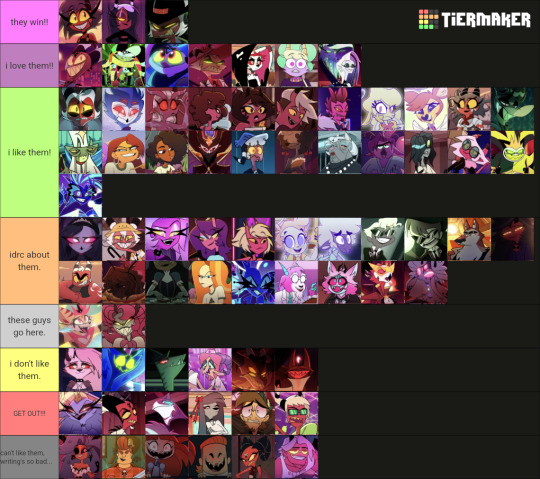
(^^ excludes my personal fanon ranking)

(^^ original tierlist)
'Superior in my Fanon'
> i feel like i don't need to say that in my version of hb the dynamics between I.M.P. would be very different. still found family, just a better depiction of it.
> best way to fix Mayberry is to NOT have her end up with the woman she tried to kill both in real life AND after death imo. or at the least, flesh her personality out some more before doing so.
> in my version of hb Paimon isn't different in terms of personality. he's just around more in the current timeline and has more definitive interactions with Stolas.
> i don't remember the name of the guy from the blitzø hate party episode, but while he serves as a good show of stolas' flaws and weaknesses, i'd have preferred if he stood as more of a positive comparison to blitzø, highlighting the latter's flaws. this would include a little more screen time and a show of what exactly led to im and stolas dancing and kissing.
'Win(ners)'
> I do NOT support Crimson's actions. However, he is one of the few solid villains we have left in Helluva Boss (and also I have a thing for villains).
> a lot of people take issue with Sallie Mae for reasons to her gender and how it's portrayed in merch + 'not portrayed sufficiently' in the show but I can't think of a single thing that's wrong with her and how she's written.
'Love'
> y'all are hating on Envy for NOTHING 😭😭😭 i mean hating the design is valid but why are we surprised that it isn't accurate to the sources viv based it on?? this isn't new? and at least Envy isn't an eyesore like some others... but i'm maybe people want more of that?? idk, i feel like they're overhated. i love their design, that's about the only reason they're ranked so high.
'Like'
> yes, i do like Stolas!! he's done a lot of things i don't like but it's part of his development. plus, realizing that he actually gets a lot of lasting consequences in canon (regardless of whether he ignores them or not) made me ease up on him. plus he's a crybaby twink. how could i not like a crybaby twink.
> a lot of the characters in this category are either here for their design or their defining moment. Chaz is a bit of a special case, and so is the hellhound adoption center lady. we're sleeping on Barbie Wire's rehab nurse, she did her job GOOD.
'Idrc'
> not much to say here. every character listed in this tier has failed to captivate my interest and for that, i simply don't think of them. a big point i thought of was "who are they without their defining drama?" and for most of them the answer was "little to nothing".
> there's a few random side characters in this tier. they are only present becuse they're side characters that i figured people would remember, and i wanted to state my opinion on them.
'I don't like them'
> all these characters are here because i either dislike the limited appearance they had, dislike their personality, or have extenuating beef.
> there's so much i dislike about Asmodeus- pretty much the same things i dislike about Beelzebub, but i decided to spare him from the very bottom of the list because he is one of the more actively kinder characters in the show.
#alright judge away#i will gladly elaborate on anything else#helluva boss#helluva boss discourse#vivziepop#vivienne medrano#helluva boss blitzø#helluva boss loona#stolas goetia#helluva boss millie#helluva boss striker#verosika mayday#barbie wire#helluva boss barbie wire#helluva boss andrealphus#helluva boss vassago#octavia goetia#stella goetia#queen bee#helluva boss beelzebub#helluva boss asmodeus#helluva boss fizzarolli#helluva boss belphegor#helluva boss envy#crimson knolastname#helluva boss sallie may
6 notes
·
View notes
Text
.
there are many reasons for which the za/um story fucks me up, but I still think most people talking about it can't really understand the gnarly entanglement and the extremes that a truly rancid and toxic work environment in which driven people who want to tell meaningful things through videogames, and the mixture of that with deadened corporate interests, can push the same people to get lost into.
I do believe there were a lot of flaws in the way it may have been presented to the public before, but I think people are a little quick to think they themselves would have extracted the correct and pure and pristine conclusions out of a situation that looks like such an absolute loaded clusterfuck.
gamedev can be so fucking messy, and things can be both very simple and painfully complicated and impossible to ever rub fully clean too. I don't even know if it's possible to convey how insane you can feel in such a context if you didn't live through it yourself honestly.
of course, capital interests are what matter and they do rot everything, and that creatives were robbed of their own world is beyond heartbreaking and awful, and no matter what anyone did or didn't do this should have never happened. this should be centered and highlighted. but I think people who tried to remember the team beyond the core of auteurs (that I respect beyond words, let's be super clear here) and how they experienced the whole ordeal were also not wrong to try to do that, even if it was done in a very clumsy and hurtful way, and navigated a minefield with the grace of a drunk elephant and served really disgusting interests in the process.
but the way you get rolled over and chewed on and used as a pawn and thrown out when no longer useful when you are the little guy stuck in a battle of giants, can be very very bad and no fun at all, and the audience tend not to give a damn about those people without the Big Names and Big Responsibilities, which do faciliate this kind of careless abuse that doesn't even register as abuse in the head of these people. And I think it's important to have the little guy's perspective centered too every once in a while, even if it does complicate things on a human level.
I don't know. It's just a steaming pile of garbage from top to bottom.
#thoughts#gamedev#za/um badness#what matters is ultimately corporate interests obviously and it's what should be highlighted#but the internal web of pain and resentment and lies and dripping toxicity can be really really difficult to parse away from a Clean Truth#and when you want to make sure everybody gets a voice#it's very easy to make choices that aren't ideal#but there are situations in which if you talk the result is bad#if you don't talk the result is less bad but also you completely ignored your own pain for the narrative to get simplified#for the sake of the clarity of Truth and Justice#I don't know.#yeah I don't know it's just awful#and I think most people don't understand how bad and messy it can all get#again maybe it's projection but. yeah. I don't know.#I just really don't like the way it's being talked about online
9 notes
·
View notes
Text
Eden of The East

I want to start off by saying how interesting it is to get a view into life in the early 2000s. Although I was technically alive during this time, I never truly got to experience it. Also Micchon must be a genius because she somehow created an AI image recognition system while people were still on flip phones. Anyways, let me get to the analyzing. Straight off the bat in the first episode we get to see Saki’s fascination with Washington DC as in her eyes it’s the center of the world. Obviously she does not mean this in a literal sense but rather that she sees the U.S. as somewhere with international importance and strength. This is something that in previous decades Japan had but lost during the 80s when the economic bubble burst. Saki meets Akira who we find out is part of a game where the main mission is saving Japan. The players all have varying strategies in how to do this, but Akira believed in supporting NEETs (people with no intention of getting employed) and getting them back on their feet.

In a way Akira embodies the Neo Liberalist thought that NEETs are a problem in society. According to his approach to save Japan, NEETs are a problem holding Japan back that need to be dealt with. Yet, Akira also goes against Neo Liberalist tendencies because typically a Neo liberalist would blame NEETs for their own misfortune rather than pointing out societal flaws. Akira acts as the support that the government lacked in providing.

In opposition to those who chose to reject Japan’s work culture and became NEETs are the majority who attempted to find work and fit into society. Saki felt as if she was burdening her family who continued to house her while she was in search of a Job. This highlights the popular belief that if you were jobless, you were a burden on society. Saki graduated college and it was time for her to partake in Shushoku (the search for a job after graduating). Saki’s short lived job hunt also highlighted Japan’s toxic work culture. Her potential co-workers belittled her behind her back and the boss even had food purposely spilled on her all because she missed her original interview date.
For context, this show first aired in 2009. It has been fifteen years and Japan is still known for their toxic work culture, NEETs, and Hikikomoris. I would like to say that the situation is improving, but evidently it is not or at least not at a desirable pace.
3 notes
·
View notes
Text
To 🎩 anon (you turned off anon and I'm not sure if that was an accident or not),
"Dear jester I loved reading all that you had said, i found it rather interesting and i feel that we have the same way of processing each event, methodically and in order ! The situations are rather chaotic, but sifting through each element has helped me tremendously to sort out everything.
I deeply thank you for sharing all that with me.
Seems i relate to you even more now, i am also very mature for my age (same as you) and have become rather burnt out with my schooling and life just in general. I was in a period of time where I had lost all sense of feeling, as i had spent years and years tied to people and in lots of emotional turmoil. He got me out of a very awful time, showed me what true love and kindness was. Never have i experienced that in my life, nor did i ever want to. But now that i have, i don't ever want to let go. Even though he is turning 20 in 8 days
At first, i was scared. Couldn't tell him about that specific factor of me. Although recently, i did, and i somehow knew that he had already known, yet was still too afraid i'd get left again. Seems like he cant leave me either but i guess thats a little fucked up hahaha im glad you realise the pros and cons with your situation and know that although you're obsessed with her, you know its for the better to be apart. I am yet to learn that hahaah !
I find solace knowing we have had similar experiences, although how unfortunate they are, we will find what works for us and what helps us get better. I hope you dont mind my little rambling haha I love your posts tremendously and i am glad you are doing better!
i guess i should make an anon hmmm :3
-🎩 anon"
TL;DR: Find a way to wean off him
My situation seems to be somewhat different than yours as you're still in contact with him and know much more about him than I do about her, I'm not sure how deep your obsession is with him but I'll give you some things that'll at least help you wean off him:
Highlight his flaws:
For me, my obsession centered around entitlement and objectification; she was only a girl meant to help ME through MY problems and give ME comfort. Any time it seemed like I was doing something for her, it just so happened that my attempt of self-gratification just so happens to benefit her (EX: I want to kidnap you because I don't see you as your person, but something to be owned). The more I took the time to look at how she looked, her misspellings, and her overall demeanor, I stopped seeing her as a concept meant to please me and more as a person, a person I didn't want to date.
Consider your personality:
As I grew up and started to become my own person, I realized that my personality didn't mesh as well with hers; I was easily distracted, easily annoyed, mentally unstable, emotionally dependant, but physically distant, and hypersexual. That didn't go well with how naive, childish, and go with the flow she could be and that didn't sit right with me. What if I yell at her?! What if she's uncomfortable with my advances, how would I react? What if I become too dependant on her?! Would that annoy her?! Write about him:
I didn't write about her too much, but it did help me realize how truly fucked up our one-sided "relationship" was looking back (even just a day later) at my writings that were begging myself to let go of her really made me break those rose colored glasses
Hang out with friends more:
I know it's insanely cliche, but hear me out!
As I hung out with my friend more and talked to her less, I found myself becoming slightly more dependant on them as they were healthier to be around and can keep me from doing stupid stuff like contacting her again.
Indulge in fiction:
Around 2020, I found myself getting deep into a series (that I still love to this day) that kept my attention and slowly took over my brain, almost replacing my affection for her. I found so many characters that acted just like her and a lot of them annoyed me, which I think solidified my first point of only like her as a concept and not a person.
Consider the future:
Ask yourself: a couple years from now, when you're 18 (assuming you're a minor, but if not just imagine yourself older), do you see yourself with him?
Showing him off to your parents?
Doing mundane tasks non-romantic tasks like doing laundry?
What would being with him look like?
Do you want to get married to him? Have kids? Grow old?
How romanized is your future with him? When you look at your future with him do you see an ideal person, an almost god-like being with zero flaws or do you see him?
My answer to half of these questions was,"God no"
Like I said before, I don't know much about your situation; how long you've known him, how long you've talked to him, ect ect. so these might not be helpful, but I, at the very least, want you to distance yourself from him a bit, especially if the age gap is as bad as mine (16/21).
2 notes
·
View notes
Text
Last week, during a swing through Miami, Donald Trump stopped by a community center in Little Haiti. Trump has never held much interest in Haiti or Haitian Americans, and it showed. Instead of the usual bluster, the reality TV star tentatively read some vague, prepared remarks off a sheet of paper, then sat back on a stool “to listen and to learn” for a few minutes from the small crowd of mostly middle-aged, upper- and middle-class Haitian Americans in dark suits and print dresses, scattered among a few rows of folding chairs.
Not long ago, Trump’s team glommed onto the possibility that Haitian Americans—generally black, generally Democratic-leaning voters who make up roughly 2 percent of the population of Florida, where Trump and Hillary Clinton are separated by less than a point—might be persuaded to vote against the former secretary of state. The irony of a nativist pandering to thousands of immigrants and refugees aside, there was a logic to this. Many people rightly identify Clinton with failures of humanitarianism and development in Haiti. The Trump team has folded that perception into a half-true narrative in which Haiti—like Whitewater and Benghazi before it—becomes a synecdoche for all the ills, real and imagined, of the Clintons themselves.
There are good reasons the world’s first black republic has been an island-sized headache for Clinton as she seeks the presidency. Haiti is a place where some of the darkest suppositions that lurk on the left and right about her and her husband take form. Here is an island country of 10 million people where America’s ultimate power couple invested considerable time and reputation. Here is a fragile state where each took turns implementing destructive policies whose highlights include overthrowing a presidential election. Bill Clinton in particular mixed personal relationships, business, and unaccountable power in ways that, if never exactly criminal, arouse the kind of suspicion that erodes public trust. No two individuals, including Haiti’s own leaders, enjoyed more power and influence than the Clintons in the morass of the failed reconstruction following the deadly Jan. 12, 2010, earthquake, when a troubled country managed to go from catastrophe to worse.
The Clintons compounded the resulting political problem the way they usually do, by saying as little as possible while letting their enemies fill in the blanks. A year before he became Trump’s campaign “CEO,” Breitbart News chairman Steve Bannon began pushing facile theories of corruption and malfeasance in the book Clinton Cash, written by Peter Schweizer under the aegis of Bannon’s Orwellianly named Government Accountability Institute. It was later turned into a film. Both versions of Clinton Cash tell a kaleidoscopic version of Haiti’s post-quake story, remixed and more than occasionally fudged to push the Clintons into the center. Those flawed but relatively measured accounts in turn inspired whack-job theories that have become articles of faith in the anti-Clinton fever swamps, such as the fantasy that Hillary and Bill just straight up stole billions of dollars in post-quake relief money—an impossible claim so unmoored from reality that even Peter Schweitzer didn’t bother making it.
The reality is a lot more complicated (and interesting) than that. The United States and Haiti were the first two independent republics in the Americas, and our often blood-soaked relationship goes back a lot further than the meeting of a silky Arkansan and an ambitious Illinoisan at Yale Law School.
Trump, probably unwittingly, submerged himself in some relatively recent chapters of that history at the Little Haiti Cultural Center. His host was Georges Saati, a wealthy Lebanese-Haitian industrialist whose family backed the brutal 20th-century dictatorships of François and Jean-Claude Duvalier and whose far-right faction helped foment the violent overthrow of President Jean-Bertrand Aristide in 2004. Trump was also treated to a speech by Bernard Sansaricq, a radical right-wing ex-Haitian legislator whom the Los Angeles Times once called the “self-proclaimed president of Haiti’s Senate” and who collaborated with the military junta that ruled during Aristide’s first exile in the 1990s, following a coup carried out during the George H.W. Bush administration by former Duvalierists on the CIA payroll. Trump was so moved that this week, his staff published another statement by Sansaricq on its website.
Both wealthy Haitians openly loathe Bill Clinton, who ordered the U.S. invasion that put down the junta and restored Aristide to power, for a time. Sansaricq, who long ago left Haiti and ran unsuccessfully for U.S. Congress as a Republican in 2010 and 2012, repeated nonsensical, Breitbart-esque claims about “the whole world” having given “billions of dollars to the Clinton Foundation for the Haitians” (false: The Clinton Foundation has raised about $30 million in connection with Haiti and was at no point a general clearinghouse for post-quake relief money) and promising Trump the Haitian American community’s support if he will “ask Hillary Clinton to disclose the audit of all the money they have stolen from Haiti.”
Trump nodded thoughtfully. “I didn’t understand,” he said, “now I understand it.”
He didn’t. I know, because I’ve spent years looking into what’s really gone on in Haiti. I was the Associated Press correspondent in Port-au-Prince from 2007 to 2011 and survived the earthquake in 2010. I’ve spent years digging into the details of the response and recovery, much of which I put in a book. I’ve also done extensive, critical reporting on the Clintons’ roles in particular, which is why my name appears halfway through the Clinton Cash documentary, misleadingly implying that I was some sort of corroborating source.
In all that time, neither I nor anyone else has found the coveted evidence of either Clinton making off with vast sums of money from Haiti or the relief effort. And while America’s foremost power couple may be as culpable as anyone for the disastrous results of the earthquake response, it is fundamentally misleading to say that they are singularly responsible for it, much less for America’s long and abusive history with its oldest and poorest neighbor. I wish things were that simple.
* * *
There’s a real case to be made against Hillary Clinton in Haiti. From her first days as secretary of state, Clinton saw the island republic as a place to “road-test” a central piece of her foreign policy vision of “elevating development alongside diplomacy and defense as core pillars of American power.” Haiti would be a major example of “economic statecraft,” as she called it, where business and government partner to address natural disasters, poverty, and disease, neutralizing threats while generating money and power for the United States—what her husband would call a “win-win-win.”
Clinton has gotten grief in this election for that kind of thinking, exemplified elsewhere by a 2011 speech in which she pitched reconstruction in Iraq, eight years after the U.S. invasion, as a “business opportunity.” In reality, what she is pushing has been standard U.S. foreign policy for more than a century. (In Iraq, she was very late to the party.) It’s no less true when it comes to “humanitarianism.” The U.S. government devotes less than 1 percent of its budget to “foreign aid,” most of which goes to vendors based in the United States. For instance, nearly half a billion dollars of U.S. government relief aid “for Haiti” following the 2010 earthquake went to the Defense Department. The vast majority of U.S. government contracts went to American firms; almost no cash ever went, or was intended to go, to Haitians or the Haitian government. The same is true for nearly all nongovernmental organizations and charities, including the American Red Cross.
Despite promises to change this way of doing aid, both Clintons rode herd on business as usual—Hillary as head of the State Department (which effectively includes the U.S. Agency for International Development, or USAID), and Bill in his panoply of roles, including co-chairing the Interim Haiti Recovery Commission (IHRC), a nominally Haitian government agency charged with overseeing the allocation of reconstruction money donated by foreign governments to a World Bank–managed fund for 18 months after the earthquake.* USAID, ignoring recommendations to hire Haitian contractors, brought in several U.S. firms (and one Mexican firm) to build a housing development. The added cost of flights, hotels, cars, food allowances, living expenses, and “danger pay” ballooned the cost per house from $8,000 to $33,000, investigative reporter Jake Johnston found. Ultimately two of the American contractors were suspended from receiving future government contracts. “Out of ignorance, there was much arrogance,” a Haitian official told Johnston.
But when the right isn’t beating the Clintons over the head about it, this pattern—keeping the money close to home—is how most conservatives, and a lot of other Americans, want foreign aid to work. Clinton’s insistence that relief and development efforts yield benefits for American businesses and consumers is aimed mostly at critics who don’t understand that this is how U.S. aid and intervention always operate. (That includes Trump himself, who told a Fox News town hall in April: “We have many, many countries that we give a lot of money to, and we get absolutely nothing in return, and that’s going to stop fast.”)
Before and after the earthquake, the State Department openly and enthusiastically pushed a vision of prosperity for Haiti through foreign investment in tourism, construction, and low-wage garment factories. In its view, this would save Haitians from poverty and prevent future refugee crises while making money for American and multinational corporations. That idea is badly flawed—among other things, the low wages and sweeping tax exemptions investors demand mean little money flows into the local economy—but it’s the program every single U.S. presidential administration has backed in Haiti since at least the 1960s. In the 1970s and early 1980s, Haiti produced huge quantities of cheap clothes, toys—and at one point all the baseballs used in the U.S. major leagues—earning it the nickname the “Taiwan of the Caribbean.” It’s a bipartisan effort: Clinton’s vision of “economic statecraft” isn’t all that different from the policies Ronald Reagan was pushing when his administration created the Caribbean Basin Initiative.
But efforts to resurrect the assembly sector, which collapsed in the turmoil following the fall of the Duvalier dictatorship 1986, got ugly. A few months before the quake, U.S. embassy officials pressured the then-Haitian president, René Préval, to nix a legislative proposal to raise the minimum wage for garment factory workers from roughly 22 cents an hour to 62 cents an hour, arguing that higher wages would discourage investment. Préval and legislators compromised at 38 cents an hour. (It has since gone up.) Bill used his newly minted position as U.N. special envoy to promote the economic agenda. “In the end all of our efforts will have to be judged by how many jobs we create, how much we swell the middle class, and whether we perform for the investors and make them a profit for doing the right thing,” he said at the time.
Once the disaster struck, the U.S. government focused its reconstruction efforts on pushing this vision. That resulted in the construction of Caracol Industrial Park, a $300 million, 600-acre industrial development built to house garment factories in northern Haiti. The project was financed through U.S. tax money via USAID, as well as the Washington-based Inter-American Development Bank. The Clinton Foundation helped promote the project to investors. Bill and George W. Bush teamed up to lobby Congress together to expand trade preferences for Haiti-sewn apparel. Bill also used his position with the IHRC to direct further funds to the project. With the help of U.N. Secretary-General Ban Ki-moon, a former South Korean trade minister, the organizers recruited Sae-A Trading Co. Ltd., a South Korea–based global garment giant that supplies many of the clothes you buy at Target, Walmart, Gap, Old Navy, and other stores, to be the anchor tenant.
All that was at stake when, 11 months after the earthquake, Haiti held a presidential election. Millions were still displaced and polling places in rubble, but the United States and its allies were paying for the election and insisted it go on. The process fell into chaos in the first round, with riots in the streets and candidates accusing each other of manipulation and fraud.
The electoral mess increased the Americans’ frustrations with Préval; they blamed his recalcitrance and skepticism about foreign intervention for the slow pace of reconstruction. The U.S. embassy openly fanned the flames by saying the official electoral results conflicted with a European Union–sponsored poll. U.S. officials then pushed Préval to throw his party’s candidate out of the second-round runoff and replace him with Michel “Sweet Micky” Martelly, a raunchy pop singer who enthusiastically backed foreign investment projects including Caracol. (Martelly had also proved receptive to guidance from foreign political hands.)
Clinton’s State Department played hardball behind the scenes, revoking the visas of Préval’s inner circle and banding with France, Brazil, Canada, and the United Nations leadership to pressure the president into stepping down.
Then, on Jan. 30, 2011, the secretary personally flew to Port-au-Prince. The night before, she had traded emails with her chief of staff, Cheryl Mills, as well as the Clinton Foundation’s chief operating officer, Laura Graham, who also served as Bill’s chief of staff on the IHRC. In one email, Graham said resistance was building against the U.S. plan and that the secretary had been “specifically criticized today for imposing this solution.” Mills suggested that Clinton emphasize a message in response: “The voices of the people of Haiti must be heard. The votes of the people of Haiti must be counted fairly. And the outcome of this process must reflect the true will of the Haitian people. That is the only interest of the United States.”
Hillary delivered that message almost word for word to the Haitian and foreign press the next day. Behind closed doors, she sweet-talked Préval, convincing him that accepting the U.S.-backed candidate would secure his legacy.
Martelly became president in May. In his inaugural speech he declared, in English: “This is a new Haiti open for business, now!” Bill was in the audience.
Initially, Martelly accepted Garry Conille—Bill Clinton’s chief of staff at the U.N. Office of the Special Envoy—as his first prime minister. But sensing a babysitter, Martelly quickly booted him out and replaced him with his own business partner. “The situation cannot afford Washington to sit on sidelines. They elected him and they need [sic] pressure him,” Graham grumbled to Mills in an unusually candid email.
The earthquake recovery foundered, inflation spiraled, and violence spiked. Martelly left office earlier this year amid an unfinished, fraud-wracked election; for a week, the country had no president. Haiti is now struggling with a weak, transitional government. Demonstrations loom, as do strikes and threats of takeover by armed militants.
Caracol opened in 2012 with both Clintons joining Martelly (and an acquiescent Préval) at the opening ceremony. The project has been a disappointment by any measure. Sae-A brought in a fraction of the jobs it promised. Its employees grumble about the long hours, tough conditions, and low pay. The project has had little positive impact on Haiti’s economy so far.
* * *
Trump has criticized Caracol on the stump, referring in a recent speech to the time that “Hillary Clinton set aside environmental and labor rules to help a South Korean company with a record of violating workers’ rights set up what amounts to a sweatshop in Haiti.” It’s a hypocritical complaint for a mogul who employs his own sweatshop labor in China and Central America. Small wonder that he dropped that line of criticism at the Little Haiti event, where his hosts were wealthy industrialists whose opposition to Aristide (and Bill Clinton) was rooted in large part in the former Haitian leader’s resistance to garment-factory owners and foreign investment schemes. Still, it’s only a bit overstated—while Hillary built nothing alone, her State Department pushed hard to get the park up quickly, over the objections of other administration departments.
But what the shallower critics of the Clintons miss is whom this fundamentally unjust system is designed to benefit. Despite cherry-picked, half-understood stories about permits for nonexistent gold mines and isolated instances of naked (and duly punished) fraud that account for rounding errors in the actual billions raised and spent after the earthquake, there is simply no evidence that the intent was to line the Clintons’ pockets.
The system isn’t designed for them; it’s for us. The low wages that the U.S. embassy helped suppress are the reason we can enjoy a steady stream of $9 Mossimo camisoles and $12.99 six-packs of Hanes T-shirts. Even U.S. military uniform parts get made in Haitian sweatshops. As America moves further away from its producer past and deeper into its consumer present, we will want cheaper and cheaper smartphones and cheaper and cheaper clothes that we can afford on our stagnant service wages, and we will demand our leaders find us alternatives to sourcing from rivals like China. Places like Caracol are the result. Some Americans say they want production jobs to come back home, but few are ready to pay twice as much for their clothes or $100 extra for their iPhones, most of which would still have to be sourced from overseas.
To get the things we want, the United States has been in the business of overturning elections and toppling governments for more than a century. Clinton’s trip to Haiti in 2011 represents the softer end of a long tradition of U.S. invasions, coups, and usurpations: Panama in 1903 to Iran, 1953; Guatemala, 1954, to Congo, 1961; Vietnam, 1963, to Chile, 1973, to Iraq 2003, and on and on.
The U.S. Marines occupied Haiti from 1915 to 1934, helping foster the overcentralization—whereby American-run businesses and breaks on custom duties were concentrated in the capital—that made the 2010 earthquake so deadly. And we have been meddling ever since—ferrying leaders out and in and out again. As Trump was reminded in Little Haiti, Bill Clinton ordered the 1994 U.S. invasion. George W. Bush ordered his in 2004. The U.N. peacekeeping mission that dumped cholera into Haiti’s waterways a few months after the quake had nothing to do with Clinton’s U.N. Office of the Special Envoy; it was created years earlier, during the Bush administration, to take over from his U.S.-led force and has been kept there and aggressively defended by administrations through Barack Obama’s in large part because it is cheaper than sending U.S. troops back again.
That military might is used, explicitly, to keep things from deteriorating to the point that thousands of Haitians flee toward Florida, as they did in the 1980s and 1990s. Why? Because as it turns out, a lot of Americans aren’t fond of refugees.
None of this gets the Clintons off the hook for the actions they are personally responsible for in Haiti. I’ve asked Hillary’s spokesman many times to comment on how things have turned out there and what if anything she would do differently as president. He said once that she’d comment “when the time comes to do so.” That was back in April 2015. I’m still waiting.
Bill continues to mix his post-presidential fame and Haiti business matchmaking in ways that set off alarm bells—often in conjunction with his trademark quarter-million-dollar speaking fees. In the reconstruction effort, he often partnered with Irish cell phone company Digicel and its head, Denis O’Brien. The company helped arrange at least one lucrative speaking engagement for the former president, while the Clinton Foundation “facilitated introductions” to help O’Brien build a luxurious new Marriott hotel next to Digicel’s Port-au-Prince headquarters. USAID has directed about $1.3 million to Digicel since 2008, along with private grant money. Digicel has donated tens of millions of dollars to the Clinton Foundation. It’s hard to say how, or even if, any of those parts fit together: Digicel was dominating Haiti’s cell phone market and doing development work there long before the Clintons re-engaged with the country in 2009. USAID money started going to Digicel while George W. Bush and Condoleezza Rice were running U.S. foreign policy, and most has been paid out since Clinton left the State Department. An indirect speaking fee is hardly proof of a kickback scheme. Still, the relationship is clearly an example of the many ways money and celebrity combine and strengthen each other at the highest levels of power.
But it ignores all history and logic to pin the whole sordid tale of Haiti’s relief and reconstruction disasters on one couple, no matter how powerful they have been. Turning legitimate criticisms about U.S. intervention into a question about one candidate’s personality is a way of avoiding harder questions. The Clintons didn’t create the world we live in; they just know how to navigate it better than most of us do. If we want it to change, we have to change it. And it seems clear that electing a strongman leader who turns to putschists for advice on the developing world and who has never shied away from making money by working with corrupt regimes isn’t the answer. Changing a system that operates with millions of people and trillions of dollars will take more than shunting all the evils of empire onto one or two personalities—not when we benefit from them so eagerly and almost never change ourselves when it counts. Pretending otherwise is just a way to let ourselves off the hook, too
#The Clintons Didn’t Screw Up Haiti Alone. You Helped.#Haiti#clinton foundation#hillary clinton#bill clinton#caracol
0 notes
Text
Entry 4: Critical analysis of your internship applications relative to best practice using peer feedback.
As we approach the pointy end of this subject, I am mapping out the skills and techniques needed for my internships and internship applications. Internships are great ways to get students job ready. It is a medium to get students to sharpen up on their skills and learning what is acceptable practice in the workplace. But to secure an internship, students need to show their readiness through documents such as resumes, cover letters and responses to key selection criteria.
As explained by Derous and Ryan (2019), a great resume outlines the unique attributes of the applicant. It highlights their areas of expertise, working experience, and qualifications. It helps to create a picture for potential employers as to the kind of person they are and whether they will be a right fit for the role. Hence, tailoring my resume to enhance my skills, experience and educational background was the first step towards securing an internship. With the lessons learned from the Holmesglen job center in addition to lecture slides, I was able to create a new one.
Following the completion of my resume, I worked on a couple of drafts for cover letters. As discussed by He and Kang (2021), cover letters are documents which are attached to a curriculum vitae when applying for a job or a role. It is a way to express your interest in the role by outlying your expertise and skill set to the employer. My understanding is a cover letter is a document which is used to communicate directly to the employer by explaining how I can fulfill the role advertised and contribute to the overall success of the organization. In this context, I prepared my cover letter highlighting why I would benefit interning at a particular sport organisation based on my skills and unique value proposition.
The interview part of this subject was a real highlight. It showed some flaws in my readiness for internship and pinpointed areas of growth. It also reenforced my areas of strength and how I can sell myself in front of employers. Interviews are face to face conversations which are held between parties to ascertain whether both are a perfect fit (Kumar et al., 2019). The practice interviews were a good way to gauge where I am at with my interview skills. It was also a good measure to access whether I have integrated all the skills and lessons from week one to three as shown in image 1.0. The feedback I got from peers did a lot for me in the overall scheme of things.

Image 1.0 illustrating feedback from my peers on preparedness of internship applications.
References:
Derous, E., & Ryan, A. M. (2019). When your resume is (not) turning you down: Modelling ethnic bias in resume screening. Human Resource Management Journal, 29(2), 113–130. https://doi.org/10.1111/1748-8583.12217
He, J. C., & Kang, S. K. (2021). Covering in Cover Letters: Gender and Self-Presentation in Job Applications. Academy of Management Journal, 64(4), 1097–1126. https://doi.org/10.5465/amj.2018.1280
Kumar, N., Nordin, F., & Hitt, M. A. (2019). Interview. The Journal of Business & Industrial Marketing, 34(6), 1259–1263. https://doi.org/10.1108/JBIM-07-2019-404
0 notes
Text
Media Literacy in Sports: Unit 2
Over the years, the media has played a significant role in the way the public perceives information yet, the media is still hesitant to showcase female athletes compared to their male counterparts. The gender norms that persist in the media show male athletes being the center of sports resulting in unequal coverage and compensation for female athletes.
Unequal media coverage and compensation between female athletes and male athletes has been going on for years now with no improvements. Female athlete Sue Bird and male athlete Lebron James are just one of many examples of inequality in sports. Despite Sue Bird having won 4 championships which is equivalent to Lebron, she received less media coverage and only a fraction of the financial compensation being a mere $200,000 compared to Lebron earning over a million dollars. This financial compensation between these two athletes reinforces the bias that female athletes are less entertaining and valuable to watch than male athletes. The unequal distribution of media coverage limits the opportunities for female athletes to get brand deals and headlines. This stems from the gender norms in sports media which intend to portray male athletes as superior and more worthy of attention. The concept of "reading with the grain," as mentioned in Gendered Lives, emphasizes interpreting things as intended by the author or filmmaker. In the context of sports media, the intentional overrepresentation of male athletes in headlines and commercials gives the narrative that male sports are superior, further solidifying the stigma that female sports are not worth watching. One common argument that I tend to hear people say is the reason male athletes get more attention is because people are more interested in male-centered sports. This idea is simply flawed because the media plays a pivotal role in the way consumers view the media.
The media's portrayal of female athletes, particularly black female athletes, has been a continuous issue. In the article "Spotlights and Shadows in Media Coverage of Women’s Sports," the author highlights the tendency to depict black female athletes in a negative light. The article points out the stereotypes that black women face such as being loud, aggressive, selfish, and arrogant. It then goes on to talk about how white female athletes like Clark and Ronda Rousey are often able to express confidence and bravado without facing significant backlash. However, black athletes, such as Angel Reese, frequently face negative branding for their personalities which affects their professional opportunities. The article goes more in-depth by stating, "Black athletes, like Angel Reese, tend to get branded negatively for their personalities, which can impact their bottom line.” Over the years, sports media has made harmful stereotypes by portraying black women as aggressive and loud. It is important to recognize that such depictions do not accurately represent the personalities within the black female athlete community. Not all black women are aggressive and loud, but the media's consistent reinforcement of these stereotypes contributes to the creation of a negative and inaccurate generalization about all black women. Furthermore, there is a stark double standard in how aggression and assertiveness are perceived in sports media. While men, including white athletes, are often celebrated for displaying confidence and assertiveness, women of color, particularly black women, face criticism when expressing similar qualities. This portrayal of behavior reinforces harmful biases and contributes to the negative stereotypes about black female athletes in the media.
In terms of media literacy and sports, people can be more informed consumers by critically analyzing sports media narratives and understanding the complexities that influence these narratives.
Work Cited:
Kleen, B. (2023, June 16). Spotlights and shadows in women’s sports media coverage. Global Sport Matters. https://globalsportmatters.com/culture/2023/06/16/spotlights-shadows-womens-sports-media-coverage/
Kirk, G., & Okazawa-Rey, M. (2020a). Media representation and the creation of knowledge. In Gendered lives: Intersectional perspectives (pp. 52–56). essay, Oxford University Press.
0 notes
Text
Disney's Wish vs. Puss in Boots: The Last Wish, Wish Trailer Edition
Wishing is at the center of both Puss in Boots: The Last Wish and the upcoming Disney movie Wish- evidently. It seems to me, though, that these movies are taking very, very different approaches to wishes. One is a good approach, a good lesson, and one is bad- possibly outright evil, dressed in a sparkly package.
To start with, what is a wish?
"A wish is a dream your heart makes." Okay, nice bit of poetry, let's be a little more academic.
Dictionary.com:
verb (used with object) 1. to want; desire; long for (usually followed by an infinitive or a clause): I wish to travel. I wish that it were morning. 2. to desire (a person or thing) to be (as specified): to wish the problem settled. verb (used without object) 1. to desire; long; yearn (often followed by for): Mother says I may go if I wish. I wished for a book. 2. to make a wish: She wished more than she worked. noun 1. an act or instance of wishing. 2. a request or command: I was never forgiven for disregarding my father's wishes.
To be more casual: a wish is something you want and the act of requesting it. Language is funny, that the desire and the act of expressing the desire are the same word.
Everyone has wishes, for things, for people, for events, for conditions, for events and conditions to happen to or for people. A lot of our lives are spent trying to get those wishes fulfilled.
Should every wish be granted, if it were possible? Every single one of us would say that our wishes should be granted! Your wishes are great for you, they line up with what you consider to be a good.
The thing is, they might not be good for another. I don't mean in terms of you getting a slice of the pie and another doesn't, I mean maybe you wish someone dead, or hurt, or to belong to you. 'Dark desires' is sold as a sexy phrase, but it is actually a real thing and not a good one. Dark desires include assault and murder and worse.
In all honesty, even your supposedly benign wishes might not be good for you either. A child may wish to eat ice cream all day, every day, but the result of getting that is going to be feeling sick and probably being sick and most definitely severe weight gain. It's not a bad thing to wish for an ice cream, in the way it would be bad to wish for someone to die. But maybe you aren't supposed to get it for your own good. I can name things in my life I dearly wished for, to the point of pain, that it turns out it was far better for me to not get. Heartache is in itself an evil.
Bad people have wishes, as well. In fact, a big part of what makes them bad is that they are pursuing the fulfillment of bad wishes, or pursuing the fulfillment of a benign wish without any regard for how they are achieving or the consequences of the wish or its pursuit.
I'm not Aquinas, this is a summing up of the issue, lots of writing has been done on pursuit of the good, I'm just giving the highlights, if you're curious about this sort of thinking (even if you don't agree or aren't interested in faith), Bishop Baron covers it a lot in his various lectures and it is a key point among many Catholic philosophers.
So far as the trailers reveal for Disney's Wish, the great conflict fo the movie is that a king with the ability to grant wishes does not grant everyone's wishes- he only grants those he believes are for the good of the kingdom as he sees it. The heroine believes- it seems so far- that everyone's wishes should be granted.
The king is clearly depicted as vain and egomaniacal. It could be his judgement is flawed and so his idea of good for the kingdom is wrong. This is a rather traditional narrative- that the holder of the office is failing to properly execute the duties of that office.
That isn't the impression the trailer leaves, though. It seems to be saying to us that, well, everyone should get their wish! A wish is a dream your heart makes!
The king wishes to keep being the wish-granter in accordance with his own will, why shouldn't he get his wish, then? Say a man wishes he could have his neighbor's wife, or that his pain-in-the-rear neighbor should die, or his competitor's business should catch on fire, should they get their wishes?
Another point. In the trailer, we see (I think, these things get cut interestingly sometimes) someone's chicken get turned into a giant chicken by the heroine, presumably because that's their wish. Well, is it good for the chicken? It's got thin little bird bones. The utility of giant eggs is questionable and chickens have a very limited laying span anyway- but a giant chicken sure would feed a family well, though then of course if they want that meal again, they'll need another giant chicken. Also, I've met chickens, and they are descendants of velociraptor and it isn't just genetic. I would not recommend anyone having a utahraptor sized chicken in their home. This wish being granted may not actually be good, as happy as the chicken owner seems to be with it.
Yes, I'm aware this is a cartoon chicken, but it's being used by the movie to make a moral point about wishes, or so it seems so far.
Contrast all this to what The Last Wish says about wishes.
There are in that movie three wishes that are being pursued: Puss' wish for his nine lives back, Goldie's wish for her birth family, and Jack's wish to own all the magic in the world.
Puss is a great hero. The whole opening is about this, and it shows that yes, he really is. Vain, yeah, but heroic. His nine lives enabled him to be a great hero, both literally (in theory...) and in how he perceived himself. If he had his nine lives back, he would feel better and the world would have a hero back.
But the movie makes clear that it's better he doesn't get his wish. He wasted his lives in stupid ways, failing not only to value his own life but the lives of others, like Kitty, who he left at the altar. Those stupid deaths also failed others because he chose vainglory and self-indulgence instead of facing danger doing what heroes do: fighting for others. It's very clear that is what he plans to continue to do when he gets his lives back. By choosing not to pursue the wish but to choose his life- to fight Death for it- and then to help keep evl from getting the wish, he chooses the far higher good.
Goldie wants her birth family back. She's never known them. She has been raised by bears, and even if they're talking bears who wear clothes, they're bears and she's human. Her reuniting with her family, who have lost their little girl all these years, would be a good thing, right, for her and them?
Except by wishing this she hurts the family she does have and has had for a long time now. She puts them in danger by pursuing it, but they keep pursuing it because it matters to her and they love her. She has failed to value that love, and by choosing to deny her wish- by blatantly choosing to save her baby brother instead- she finds a higher good.
Jack wants to own all the magic in the world. He is straight up evil, a callous, cruel, vain, envious villain who only wants power. He should not get his wish- this is a land of talking beasts and fairy tales, if he to all the magic, who knows that might happen? The heroic thing done to stop him was destroying the possibility of anyone getting the wish, and everyone involved realizes that's a good thing in profound ways, both for the world and themselves.
Not all wishes should be fulfilled for the good of the wishers and the good of others. To say it isn't fair is a profoundly selfish view of justice and goodness, narrow and limited, that thinks that all people are benevolent and good intentions for oneself, or even others, are guarantees of good outcomes.
Chalk it up to another materialistic ethics fail, though I think even a hardline materialist would agree that not all wishes should be fulfilled based on the material effects with some thought. However, I do think materialistic ethics fails to give people a foundation with which they can say a thing a person desires is actually bad for him or her.
A trailer is a small thing to judge a film that isn't out yet and we all know they can give some very wrong impressions. I hope it addresses these problems with 'every wish shouldn't be granted' from other than the vain villain's mouth, but with Disney these days I really have my doubts.
#wish#disney's wish#puss in boots 2#puss in boots: the last wish#materialistic ethics fail#this is very long#I am a giant nerd
1 note
·
View note